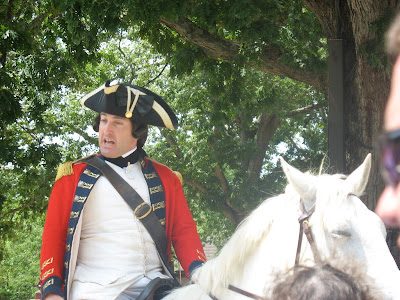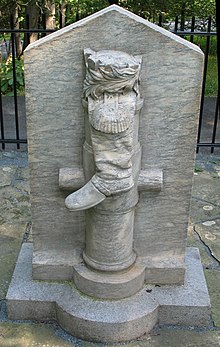The day was blazing hot and humid, and we had to walk a ways into the town.
The Governor's Palace
Groom's quarters
Virginia hams in a smokehouse. I want to try this!
The governor's kitchen
Clay wig curlers!
This is Mrs. Randolph (or Mrs. Jefferson - we can't remember which.) She is a saucy, outspoken colonial whom Rufus took a fancy to.
Here she is, arguing with Captain Innis. I liked Captain Innis, and both of them were great living historians.
The Declaration of Independence. While these gentlemen read the document, various interpreters around the plaza spoke about it, and we got to hear the points of view of women, slaves, rich and poor, revolutionary and loyalist. It was a great representation of the different perspectives.
We ate lunch at a colonial tavern and I had peanut soup with "sippets." Claire ordered grilled chopped beefsteak with fried potatoes (aka burger and fries!)
This is Benedict Arnold, who has gone over to the British. Boo!
Benedict Arnold was a general during the American Revolutionary War who originally fought for the American Continental Army but defected to the British Army. While a general on the American side, he obtained command of the fort at West Point, New York, and planned to surrender it to the British forces. After the plan was exposed in September 1780, he was commissioned into the British Army as a brigadier general.
Born in Connecticut, Arnold was a merchant operating ships on the Atlantic Ocean when the war broke out in 1775. After joining the growing army outside Boston, he distinguished himself through acts of intelligence and bravery. His actions included the Capture of Fort Ticonderoga in 1775, defensive and delaying tactics despite losing the Battle of Valcour Island on Lake Champlain in 1776, and key actions during the pivotal Battles of Saratoga in 1777.
Despite Arnold's successes, he was passed over for promotion by the Continental Congress while other officers claimed credit for some of his accomplishments. Congress investigated his accounts and found he was indebted to Congress after spending much of his own money on the war effort. Frustrated and bitter, Arnold decided to change sides in 1779, and opened secret negotiations with the British. In July 1780, was awarded command of West Point. Arnold's scheme to surrender the fort to the British was exposed when American forces captured British Major John André carrying papers that revealed the plot. Upon learning of André's capture, Arnold fled down the Hudson River to the British sloop-of-war Vulture, narrowly avoiding capture by the forces of George Washington, who had been alerted to the plot.
Arnold received a commission as a brigadier general in the British Army, an annual pension of £360, and a lump sum of over £6,000.[4] He led British forces on raids in Virginia, and against New London and Groton, Connecticut, before the war effectively ended with the American victory at Yorktown. In the winter of 1782, Arnold moved to London.
Because of the way he changed sides, his name quickly became a byword in the United States for treason or betrayal.
There is a memorial to Arnold on the Saratoga battlefield, now preserved within Saratoga National Historical Park, that does not mention his name. Donated by Civil War General John Watts DePeyster, the inscription on the Boot Monument reads: "In memory of the most brilliant soldier of the Continental army, who was desperately wounded on this spot, winning for his countrymen the decisive battle of the American Revolution, and for himself the rank of Major General."
A story that has circulated in various versions states:
When Benedict Arnold was leading the forces of the King against his former compatriots in Virginia, among his prisoners was a certain plucky and witty officer, who, in answer to Arnold's question, "What will the Americans do with me if they catch me?" replied, "They will cut off the leg which was wounded when you were fighting so gloriously for the cause of liberty, and bury it with the honors of war, and hang the rest of your body on a gibbet."
Hailey and I checked out some ladies fashions.
This is a gentleman's waistcoat. A single piece of fabric is embroidered, then cut and sewn.
The fellows had their fun too:
That was our first day at Colonial Williamsburg: hot, muggy and fascinating. Events of the Revolutionary War unfolded throughout the day as we strolled among the shops and listened to the townspeople. There was so much to see that we came back on Tuesday.





























No comments:
Post a Comment